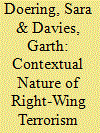| Srl | Item |
| 1 |
ID:
183005


|
|
|
|
|
| Summary/Abstract |
Despite the growing threat of right-wing terrorism as a security concern in many countries, no empirical research has examined the variables that are associated with increases or decreases in right-wing terrorist incidents at a national level of aggregation. The present study examines the applicability of indicators informed by macro-level criminological theories related to immigration, economic conditions, and social demographic composition to the study of right-wing terrorism. A dataset of right-wing terrorist incidents in North America and Western Europe from 1990–2016 was created using secondary sources. Data on indicators related to socioeconomic conditions within countries were retrieved from the World Bank’s World Development Indicator database. The results show that indicators informed by criminological theory are less useful when the analyses are aggregated across countries, but provide more insight when examining relationships within individual countries. Future research should therefore take into consideration each country’s unique social, political, and economic contexts when studying terrorism at a national level.
|
|
|
|
|
|
|
|
|
|
|
|
|
|
|
|
| 2 |
ID:
191484


|
|
|
|
|
| Summary/Abstract |
The majority of contemporary research on terrorism and extremism has focused on jihadi extremism, while other ideologies have received far less attention. In response to this gap, the current study aims to compare the similarities and differences between jihadi, right-wing and left-wing extremists at the individual level. Using the Profiles of Individual Radicalization in the United States (PIRUS) dataset, a multinomial logistic regression model was used to compare individual-level characteristics across ideologies. Additionally, a two-step cluster analysis was conducted to determine whether these similarities and differences can provide additional insights into differentiating types of extremists generally based on their personal characteristics, regardless of their ideological adherence. The results of the multinomial logistic regression illustrate that there are notable differences across extremist ideologies, but also many similarities. Further exploring ways to better highlight individual-level differences, a cluster analysis revealed five distinct groups of extremists based on their personal characteristics, and demonstrate the utility of a typology of individual characteristics that is empirically derived and validated, and is not dependent on the a priori identification or specification of ideological motivation.
|
|
|
|
|
|
|
|
|
|
|
|
|
|
|
|